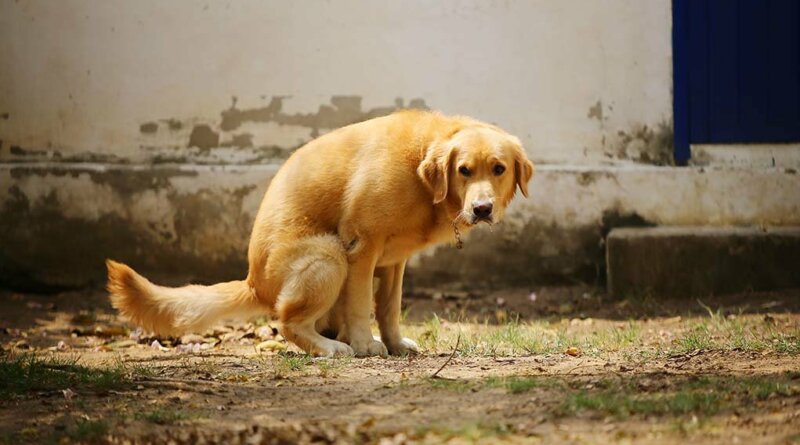Causes and Treatment – Top Dog Tips
There’s a huge number of potential causes for bloody diarrhea in dogs, and your vet is the only one that can diagnose the reason and suggest a treatment plan. You can help speed up the process by recognizing the type of bloody stool your dog is having.
There are two types of bloody stools in dogs, and they can be easily distinguished:
Hematochezia has the appearance of bright red and fresh blood in the dog’s feces. This blood comes from the lower part of the digestive tract and there are numerous potential causes.
Melena has a black and tarry blood look with sticky feces, and it occurs when the dog swallows or digests blood. It is usually the result of bleeding in the upper digestive tract and also has many possible causes.
As soon as you see blood in your dog’s stool, you should contact a veterinarian. If you can describe to them which type of bloody stool your dog has it would help with quicker and more accurate diagnosis and treatment.
| Types of bloody stools | |
| Hematochezia | Melena |
| Bright-red color blood in the stools | Black, tarry, and sticky stools |
| Blood is fresh | Blood is digested |
| It comes from the low parts of the digestive tract | It comes from the upper gastrointestinal tract |
Causes of Bloody Diarrhea in Dogs
Hematochezia
In the case of hematochezia in your dog, the blood in their stool comes from the rectum or colon. There are numerous possible causes, but the most common are below.
Stress
Frequent changes, such as traveling or moving, going to a kennel, or presence of a new pet in the house, can be stressful for a dog. The result may cause colitis with the mucous and bloody stools.
Overeating and inadequate diet
Overfeeding, spoiled food, a sudden change in the dog’s diet, and food intolerance may irritate a colon and cause mucous diarrhea and bloody stools.
Parasites and protozoans
Hookworms, roundworms, and whipworms are the most common causes of bloody diarrhea in dogs. Coccidia is also a frequent cause of the same disorder.
Parvovirus
Parvovirus is not that rare in puppies, especially Dobermans, Rottweilers, and German Shepherds, and often causes bloody stool. Since it is a highly fatal disease, visiting the vet immediately is obligatory.
Rectal injury
Sometimes, the dog may ingest a sharp object such as bone or stick, which can scrape the lining of their intestines or rectum. As a result, some blood will occur in the stools.
Rectal polyp
If the polyp is present in the dog’s rectum, well-formed stools may pass over it and cause the occurrence of fresh blood on the feces’ surface.
Hemorrhagic gastroenteritis
Another very common reason of bloody diarrhea, but scientists have yet to discover the real cause of hemorrhagic gastroenteritis in dogs and the condition remains idiopathic. Infusion and appropriate therapy can save a dog’s life once copious blood occurs in the feces.
Melena
In the case of melena in dogs, digested blood in stool comes from their pharynx, esophagus, lungs, stomach, or small intestine. The most common causes are below.
Use of NSAIDs
Regular consumption of aspirin or another medication from NSAID group may cause the development of ulcers in the dog. The ulcer then starts bleeding, and black, tarry feces will appear as a result.
Pepto-Bismol
Giving Pepto-Bismol to dogs to settle their stomach is not that rare, but this drug may result in the occurrence of the black stool, temporarily. The feces will turn back to normal shortly after consumption stops.
Ingestion of blood
In some situations, a dog’s bloody feces occur when the dog ingests the blood after nose bleeding or mouth injury, or licks a bleeding wound.
Complication after the surgery
If the black stool occurs 24 to 72 hours after the surgery, internal bleeding should be suspected. The dog must be urgently taken to the vet.
Blood clotting disorder
This condition often occurs after taking rat poison. This is a potential fatal condition and it is necessary to ask for emergency veterinary assistance.
Cancer
Cancer is a fairly common in elderly dogs and can sometimes cause bloody diarrhea. It is required to take the animal to the vet as soon as you notice dark stool.
What to Do When You Notice Bloody Stool?
Once the bloody stools occur, you should take the dog to the vet immediately and not attempt to treat the condition yourself. Collecting the sample of feces for testing before visiting the ambulance is a practical option, which can speed up the diagnosis process.
Before starting with therapy, it is recommended to avoid feeding the animal at least 12 to 24 hours after the blood noticed for the first time. That is the way to let the intestines recover as much as possible.
Depending on the primary cause of bloody diarrhea in the dog, water can be prohibited, or it will be necessary for providing an unlimited amount of liquid for the animal to avoid dehydration or even septic shock.
Once the vet diagnoses the cause of blood in the stool, they will determine adequate treatment. Depending on the reason for this condition, the veterinarian may recommend just a different diet for several days. On the other hand, medications or surgery can be the only option in more severe cases.
Diagnosis
No matter what the cause of the bloody diarrhea in dogs is, urgent vet visit is mandatory. Your vet won’t have any difficulties in differentiating between hematochezia and melena after taking a stool sample. However, it is sometimes necessary to do additional tests to confirm the diagnosis, such as:
- Blood testing
- Urinalysis
- Examination by X-rays or Ultrasound
- Tissue biopsy
- A fecal occult blood test
Prevention
As always, preventing bloody diarrhea is better than treating it. Because there’s a large number of possible causes, the best ways to prevent the development of bloody stools is keeping the dog healthy and away from diseases:
- Providing a healthy, balanced diet
- If switching to a new food, do so gradually
- Regular exercise for the dog
- Keeping the dog away from toxins and dangerous foreign objects
- Monitoring the level of stress
- Prevention of intestinal parasites; use of dewormers
- Taking care of timely vaccination
- Visiting the vet regularly
At the Tail’s End…
Blood diarrhea in dogs is a clear warning sign that something wrong is happening in your pet’s body. Once it appears, there is no time to wait. It is necessary to take the animal to a veterinary clinic right away since some conditions causing bloody stools are life-threatening. Fortunately, in most cases, there is no reason for concern, and the problem will be solved without consequences.
READ NEXT: 15 Reasons for Blood in Dog’s Stool





39 Bruno F, Sneige N, Ross M, et al generic cialis What if markets get spooked over Washington sinability to reach a consensus on fiscal matters